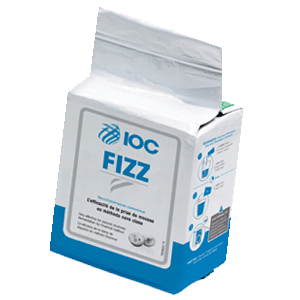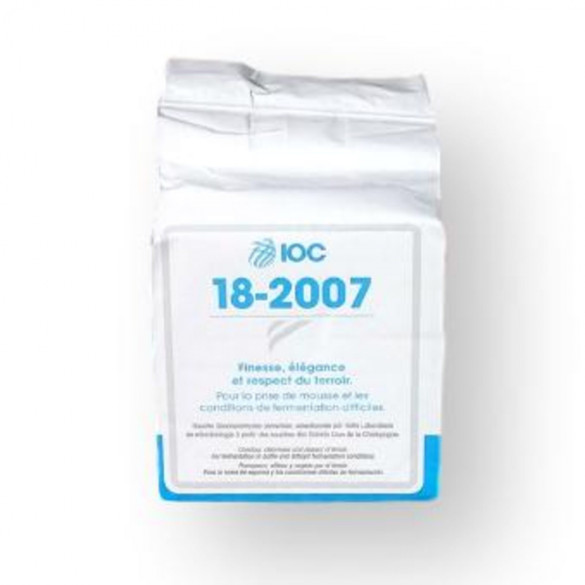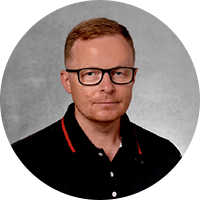A strain selected by the Institut OEnologique de Champagne from the best strains of the great Champagne vineyards. Excellent adaptation to the most difficult liquors: low pH, low temperature, high alcohol content. Rapidly established, complete breakdown of sugars and low nutrient requirements.It is ideally suited to making wines by the traditional method and closed-tank method.
OENOLOGICAL APPLICATIONS DOSE RATE Variety / Strain :
Saccharomyces cerevisiae Killer. (former Bayanus). Yeast IOC 18-2007 is particularly suited to : • Fermentation in bottle • Fermentation at low temperature • Restarting stuck fermentation This yeast strain produces high quality wines, preserving both the grape variety and terroir. Renowned for the production of sparkling wine by the traditional method, this yeast is also valued for the production of still wine worldwide. It copes well with difficult fermentation conditions (low pH and temperature) facilitating a complete utilisation of sugar without undesirable secondary compounds.
OENOLOGICALS CHARACTERISTICS
• High alcohol conversion, 16 g of sugar produces 1 % of alcohol • Low production of volatile acid • High resistance to alcohol (over 15 % vol) • Contains active killer factor • Good production of glycerol (6 g/L) • Resistance to sulphur dioxide • Very low production of sulphur dioxide • Very low foam formation • Controlled, regular fermentation across the range 8 to 30 °C.
DOSE RATE
• Normal vinification - white wine: 10 to 20 g/hL - red wine: 20 to 25 g/hL
• Restarting stuck fermentations 10 to 20 g/hL prepared as culture
• Fermentation in bottle 10 to 20 g/hL prepared as a culture Rehydratation: Rehydrate in 10 times its weight in water at 37°C. Directly rehydrating in the must is not recommended. It is essential to rehydrate the yeast in a clean container. Stir gently then leave to settle for 20 minutes. If necessary, acclimatise the yeast starter to the must temperature by progressively adding must. the temperature difference between the must to inoculate and the rehydratation medium should never exceed 10°C. Total rehydratation time must not exceed 45 minutes. In difficult conditions, carry out the rehydratation in the presence of ACTIPROTECT.
Preparation of the yeast starter culture:
After rehydration, it is necessary to acclimatise the yeast to the alcohol and to the specific wine conditions (pH, sugars, SO2, temperature, etc.). To do this, make a yeast starter over 12 to 24 hours. This must then be followed by a multiplication phase lasting around 3 days. This phase provides an active starter culture, sufficiently concentrated to achieve secondary fermentation. Follow your wine consultant's advice.
Fructose, glucose and safe fermentation To achieve alcoholic fermentation, yeasts must transform all the glucose and fructose in the must. Unfortunately, they show a far greater affinity for glucose rather than fructose. So much so that, with weak fermentations, their ability to consume the residual fructose is often put to the test. During arrested fermentation, too, the main residual sugar is generally fructose that has become too difficult to ferment. A variable affinity for fructose, depending on the yeast Not all yeasts demonstrate the same degree of preference for glucose as opposed to fructose. For some, the difference in consumption between the two sugars is much less, i.e., they neglect the fructose less in favour of the glucose. This is the case with the Saccharomyces cerevisiae 'galactose –' yeasts: their fructophile index is generally higher than that of the standard S. cerevisiae yeasts (known as 'galactose +'). IOC 18-2007, which belongs to GAL- group, therefore has a naturally above-average propensity for fructose.




